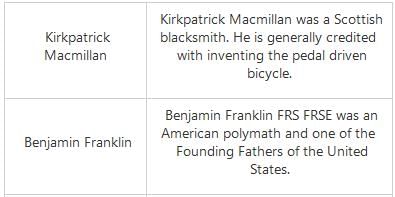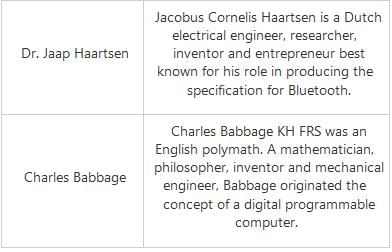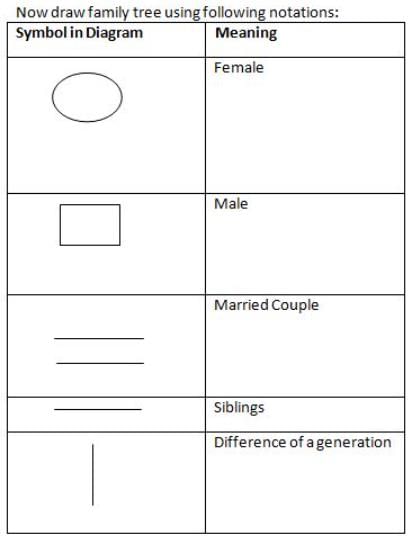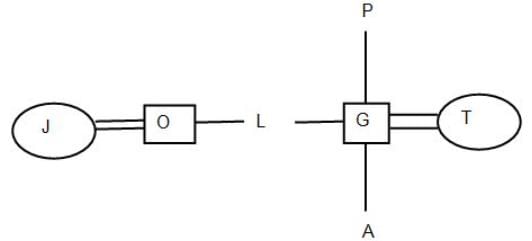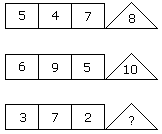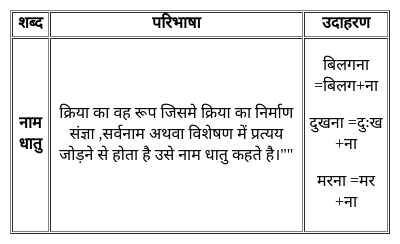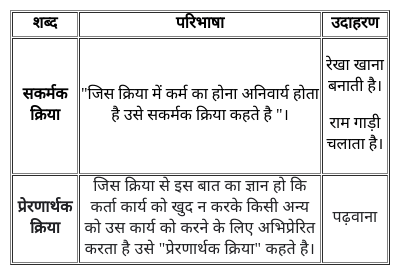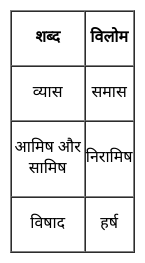EMRS PGT Biology Mock Test - 4 - EMRS MCQ
30 Questions MCQ Test - EMRS PGT Biology Mock Test - 4
Directions: Study the following information carefully to answer the given Questions:
P^Q-P is the child of Q
P!Q-P is the parent of Q
P*Q - P is elder to Q
P#Q-P is younger to Q
P@Q-P is brother of Q
P&Q - P is wife of Q
P+Q-P is sister-in-law of Q
Q. If I!J@K#L^I!M*K, the age of M is 25 years and age of L is 32 years, so what can be the age of K?
Directions: Study the following information carefully to answer the given Questions:
P^Q-P is the child of Q
P!Q-P is the parent of Q
P*Q - P is elder to Q
P#Q-P is younger to Q
P@Q-P is brother of Q
P&Q - P is wife of Q
P+Q-P is sister-in-law of Q
Q. If G! A^T+J&O@L^P! G, then how is J related to A?
P is 15m to the west of Q. R is 13m to the south of Q and 5m to the east of S. T is 20m to the north of S.T is 10m to the east of U…….
Q.
In which direction U with respect to P
Point W is 7m towards the West of point X. Point X is 3m towards the North of point Y. Point Z is 4m towards West of point Y……………
Q.
If a person walks 3m towards South from point W and reaches point Q, which of the following 2 points would fall in straight line including Q
In a row of girls, Veena is 12th from the start and 19th from the end. In another row of girls. Sunita is 14th from the start and 20th from the end. How many girls are there in both the rows together ?
The age of Amit is same as Sumit because they are twins, Richa is younger than Sumit, Richa is younger than Jyotsana but elder than Saurabh , Sumit is younger than Jyotsana. Who is the eldest among them ?
'College' is related to 'Teachers' in the same way as 'Hospital' is related to:
'Much' is related to 'Many' in the same way as 'Measure' is related to:
---------- Bar is located at top of WordPad / Notepad /MS Word window.
What type of virus use computer hosts to reproduces it?
---------- is a signaling method that handles a relatively wide range of frequencies.
The vast network of computers that connects millions of people all over the world is called.
The property that, when classes are arranged in a hierarchy, each class assumes the attributes and methods of its ancestors is
“Education is the process of natural development of the child into an enjoyable, rational, harmoniously balanced, useful and hence, natural life”. Which school of philosophy of educationbelieves that -
Which of the following is not correct about the role of government in schooling?
Caring for the cultivation of emotional health of children is as important for the schools as caring for the cultivation of their intellect, not because
“Religion has an indispensable place in the good life and the good society.” This is not supported by the argument that religion
Directions: In the following question, out of the four alternatives, select the word opposite in meaning to the word given.
Acerbic
In the following question, an idiomatic expression and its four possible meanings are given. Find out the correct meaning of the idiom.
A drop in the bucket.
Improve the bracketed part of the sentence with the parts given below.
Q. The matter was being exaggerated as some people had (a hidden) motive.
In the following question, an idiomatic expression and its four possible meanings are given. Find out the correct meaning of the idiom.
Q. M.F. Hussain's works always paint a thousand words.
The following sentence has been broken into four parts with an error in one part. Identify that part and mark it as your answer. If there are no errors in any of the given parts, mark option 4 or ‘No error’ as your answer.
Q. I will not be (1)/ able to make it (2)/ to the function tomorrow.(3)/ No error(4).



